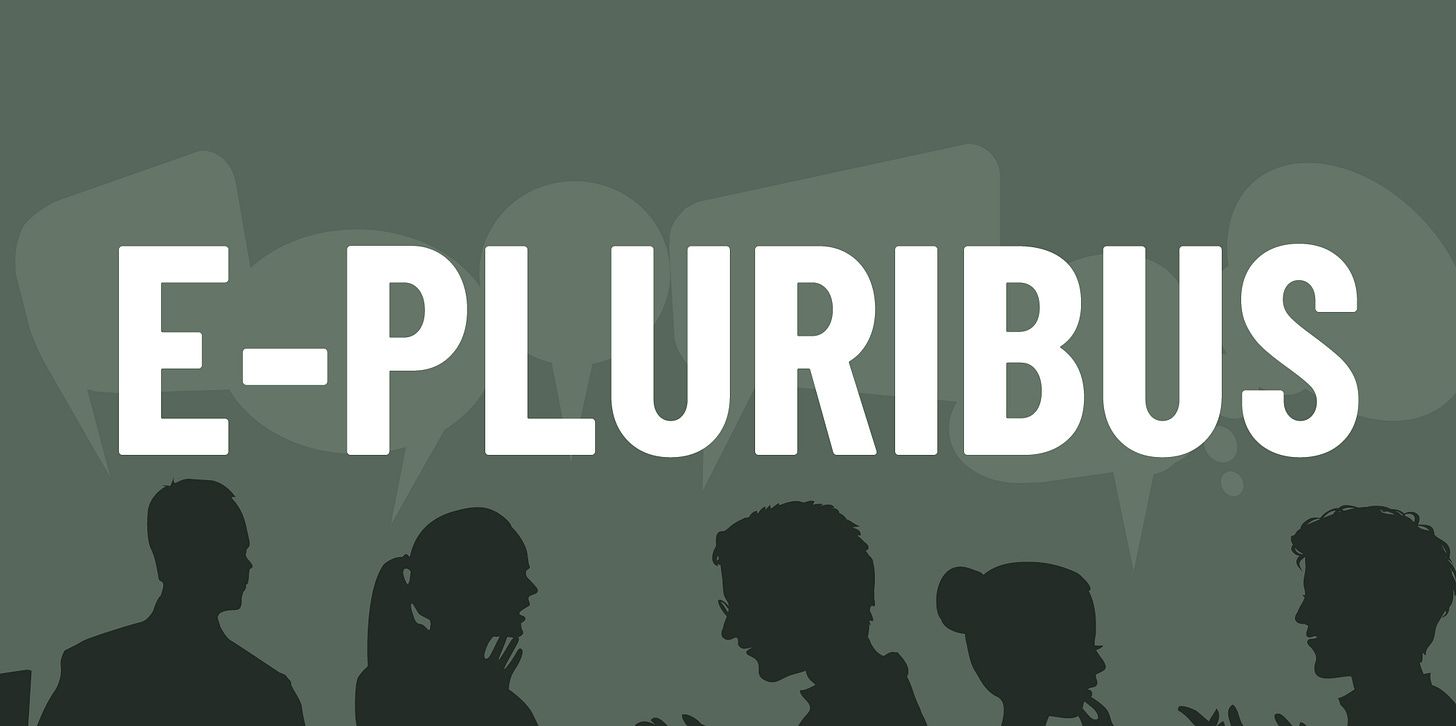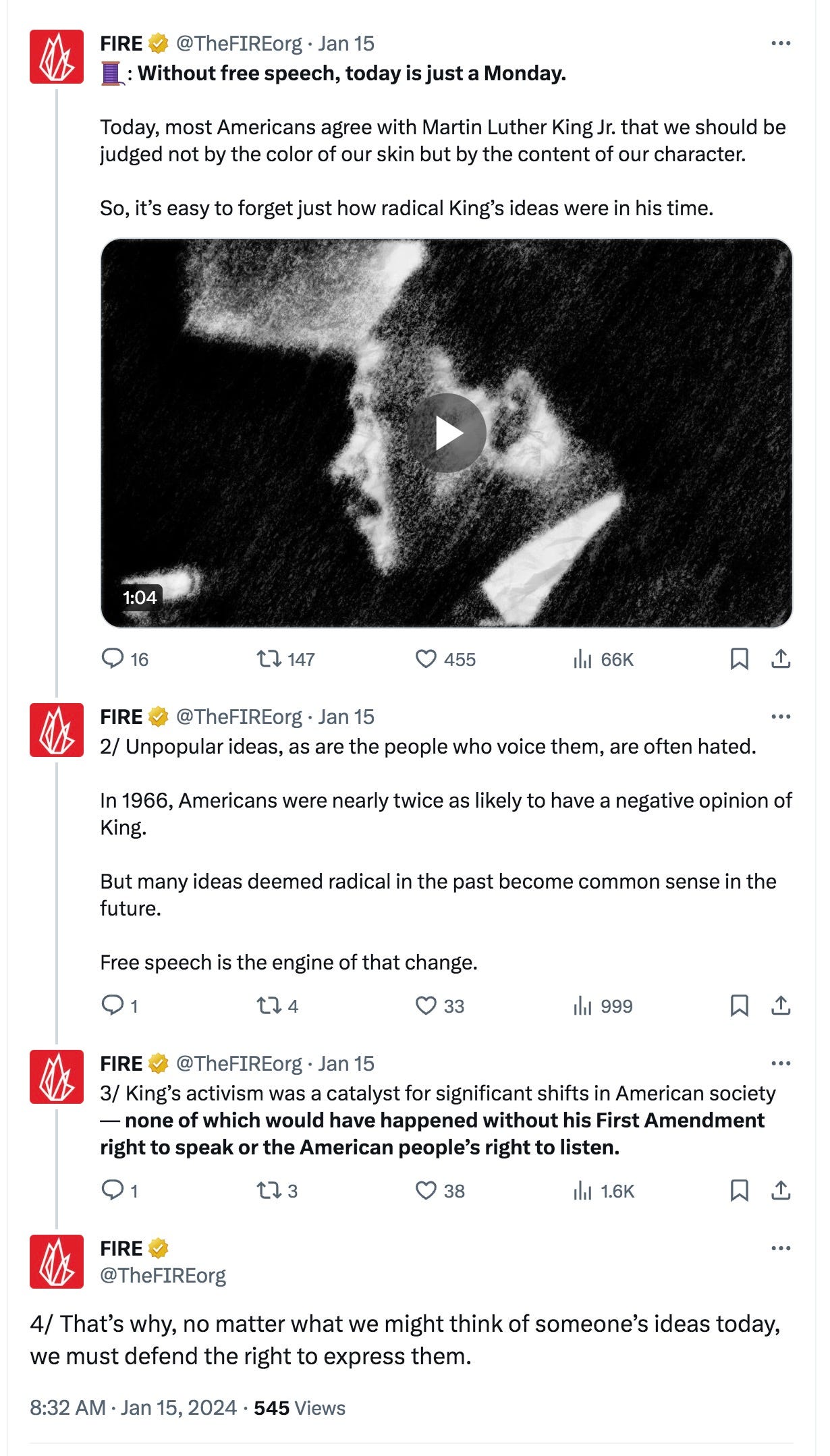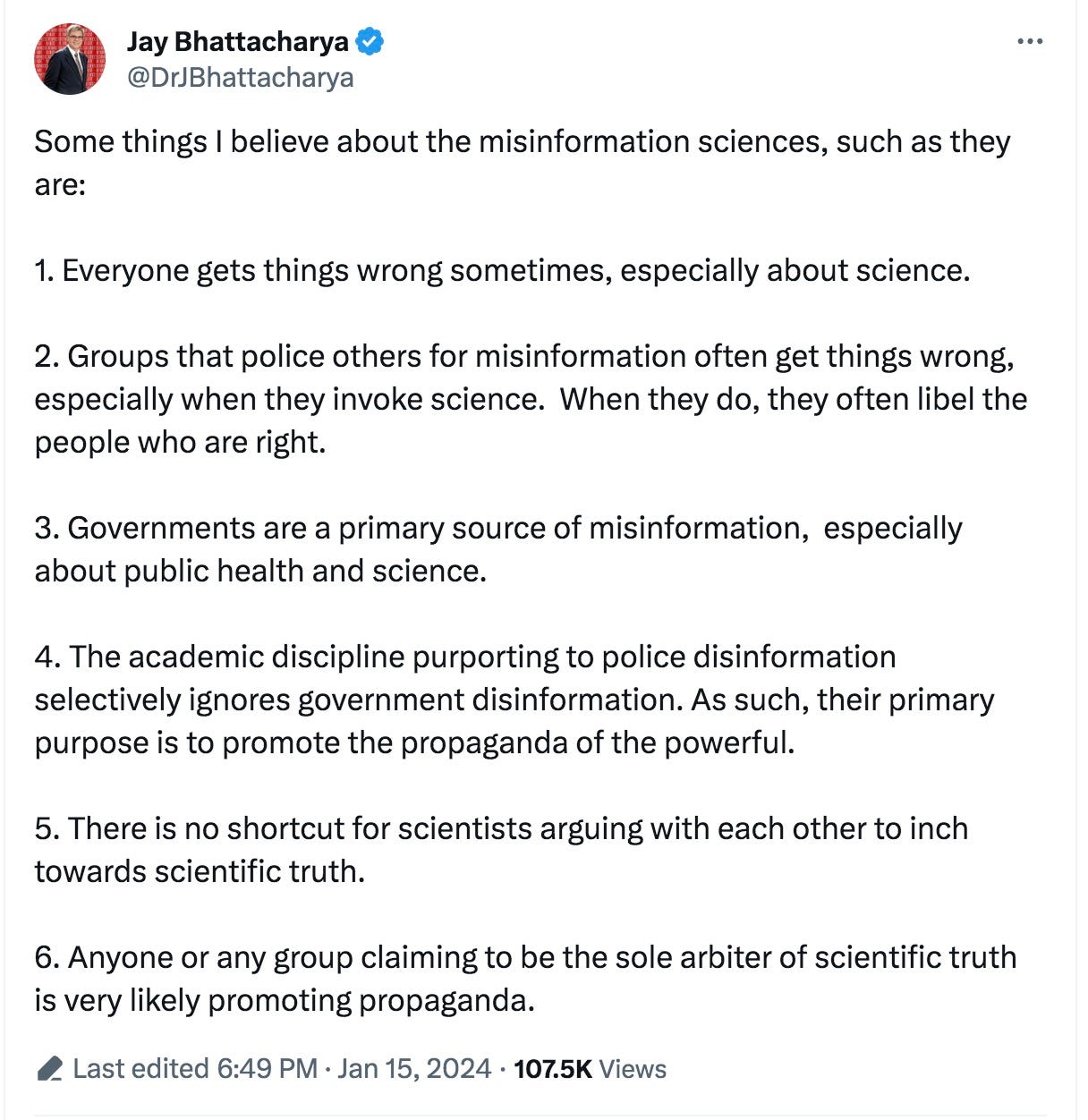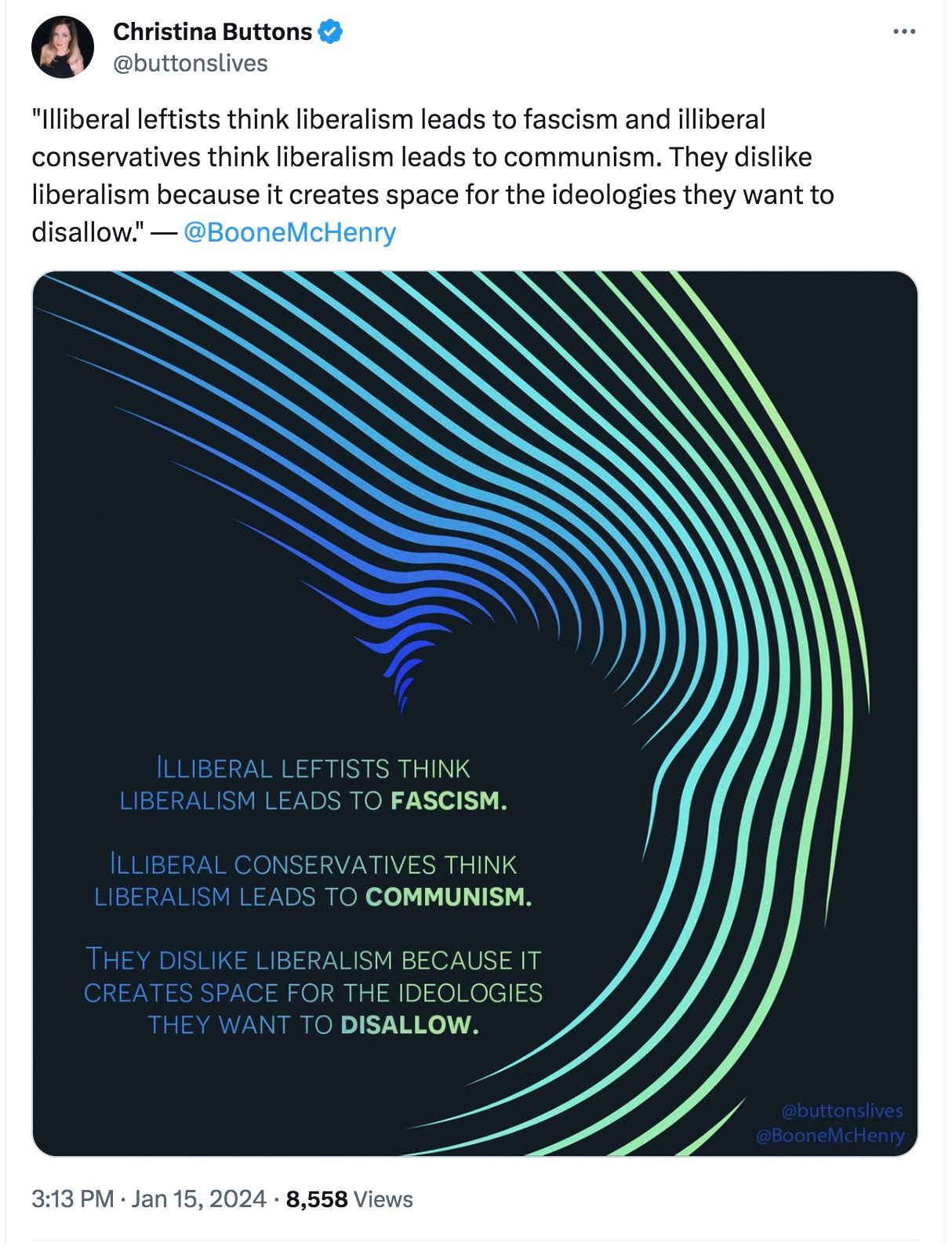E-Pluribus | January 16, 2024
The conspiracy conspiracy; diversity, equity and incognito; and it is the worst of Times.
A round-up of the latest and best musings on the rise of illiberalism in the public discourse:
Timothy P. Carney: Who changed the meaning of ‘conspiracy’ and why?
Since clearly conspiracies exists, Tim Carney writes (Washington Examiner), why are proposed explanations often slapped with the pejorative “conspiracy theory”? Carney argues that using the same term once reserved for far- fetched tall tales (“Jews control the weather”) to describe plausible solutions to unexplained events is unfair and unhelpful—and often even deliberate.
Words only mean what we understand them to mean, and if we use them to mean all sorts of things at once, they end up meaning nothing.
“Conspiracy” is the word that has been stretched the most in recent years on the torture racks of social media and the internet.
[. . .]
“Conspiracy,” for a few hundred years, described a plan hatched, usually in secret, and executed by many people working together. A “conspiracy theory” was the claim that a “conspiracy” was behind something officially chalked up to chance, nature, or a lone actor. It is a “conspiracy theory” that the CIA created crack cocaine, and it is a “conspiracy theory” that Jews control the weather.
Nowadays, though, writers use “conspiracy” and “conspiracy theory” interchangeably. This is as revealing as it is unfortunate. It almost presumes that there are no actual conspiracies in the world and that any talk of a “conspiracy” is simply a “conspiracy theory.”
This raises the question: Why should “conspiracy theory” be a term of derogation?
Tasmanian professor David Coady explored this. “The bad reputation of conspiracy theories is puzzling,” Coady recently wrote in the journal Educational Philosophy and Theory.
“After all, people do conspire. That is, they engage in secretive collective behavior which is illegal or morally questionable. Conspiracies are common in all societies throughout history, and have always been particularly common in politics. Most people conspire some of the time, and some people (e.g., spies) conspire almost all the time.”
Read it all.
Sarah Kessler: D.E.I. Goes Quiet
Writing for the New York Times newsletter Deal Book, Sarah Kessler explores the transformation of corporate DEI (diversity, equity and inclusion) efforts in the wake of growing criticism. Rather than scrap their programs, Kessler writes that some companies are simply figuring out how to keep them in place under the radar.
Critics of D.E.I., or diversity, equity and inclusion initiatives, have tried to scapegoat it for everything from regional bank failures to a panel’s ripping off a Boeing plane in flight last week. That debate gathered pace this month as three famous billionaires clashed over D.E.I.’s merits on social media: Elon Musk and Pershing Square’s chief executive, Bill Ackman, have attacked D.E.I. efforts as “racist,” while the investor Mark Cuban argued that they were “good for business.”
The economy and political landscape have changed since 2020, when companies hired D.E.I. officers in droves amid a racial reckoning after the murder of George Floyd. Recently, D.E.I. programs have become less visible. Over the past two years, hiring for D.E.I. roles has plunged and the number of investor calls mentioning D.E.I. has dropped.
That raises a question: Have companies pulled back on D.E.I.? Or have they just changed how they approach and talk about it?
D.E.I. is operating in a new environment. Last year, the Supreme Court struck down affirmative action in college admissions, setting off a wave of similar lawsuits and legal threats against company diversity programs. And while polling indicates that most Americans believe it’s good for companies to focus on diversity, equity and inclusion, there’s a wide partisan divide: In a Pew survey last year, 78 percent of workers who identified as Democrats agreed with this sentiment, while just 30 percent of Republican workers thought the same.
The pushback may have prompted a rebranding, according to D.E.I. professionals. At some companies, what used to be called a D.E.I. survey may now be advertised as a culture survey, Emerson said. Or management training once framed as part of D.E.I. efforts may instead be discussed as a course to help managers deliver performance reviews more effectively. “This term seems to be pretty widely misunderstood in ways that I don’t think any of us realized until the past couple of months,” Emerson said of D.E.I. She added that it might make sense for companies to “be far more specific about exactly what it is that we’re talking about.”
Read it all here.
ICYMI: Joseph Klein: The Times at Ebb Tide
Shortly after former New York Times editor James Bennet published his December 2023 essay When the New York Times Lost Its Way, longtime journalist Joe Klein wrote a piece largely complementing Bennet’s lost-its-way thesis. Toward the end of his article, Klein highlights a specific area of the Times coverage to make his case.
…I have found a real deficiency, a weakness based in bias, in the [New York Times] coverage of domestic policy issues, especially those that have to do with race and poverty and culture. This bias is sometimes obvious, as in the use of loaded identity phrases like “people of color,” “Latinx,” LGBTQ+, the capitalization of black but not of white, the shredding of binary pronouns—which are the signposts of an ideology that many people in this country find oppressive and inaccurate. (And yes, yes, racism, sexism and all those other isms exist, but the Left’s oft-foolish obsession with identity has given nightly fodder to the ugly, intemperate voices on Fox News.)
Far more profound is the disservice the Times has done the urban poor. There is a strangled adherence to the mouldy tenets of industrial-age, welfare-state liberalism: more money is always the answer to social programs that don’t work, crime is too often a consequence of deprivation rather than depravity, the police are brutal and racist, racism is immutable and central; there has been no progress toward an integrated, multi-cultural, multi-racial society. All of these are dangerous oversimplifications.
In my experience—a half -century now, starting with an informal tutorial at the feet of Daniel Patrick Moynihan—there are three essential components to a successful anti-poverty agenda: family preservation, neighborhood stability that comes with strict law enforcement and more creative schooling. (Other factors like better housing and mental health facilities certainly don’t hurt.) But you don’t often read about family structure, outrageous street behavior or the collapse of our inner city public schools often in the Times. Which is only the beginning:
—You don’t read much about the fact that black people are far more concerned about crime than white people are. You do read a mindless, totally uncritical celebration of extremist groups like Black Lives Matter, which is plagued by corruption and smitten by irrelevant (to the issue) causes like Palestinian “liberation” and, most important, refuses to acknowledge the vast majority of black lives that are lost to black criminals, to say nothing of the black lives protected by the police. Those lives matter, too.
—You see almost nothing about the widespread success of charter schools. Indeed, the Wall Street Journal was the only major publication, to my knowledge, that made anything of a massive recent Stanford University study that demonstrated how well the charters are working nationally. When was the last time the Times took a look at the progress being made by the all-charter school system in a the very poor city of New Orleans? When has the Times done anything but tacitly celebrate the thuggish teachers’ unions, which kept the schools closed far too long during the pandemic? Why did we have to read about the utter impossibility of getting a public school teacher fired in The New Yorker more than a decade ago? Why do we read so little about the wild success of the Harlem Children’s Zone charter schools? Or the incredible sacrifice, and great love—and academic success—demonstrated by the nuns in inner city parochial schools? (Ahh, the unions and their minions at the Times reply, the charter and parochial schools can get rid of bad actors, public schools can’t. But the New Orleans schools can’t, either—and the parochial schools expel very few.)
—You may read in the Times that early childhood education is a crucial component of learning and that lots more money should be spent on it, but you don’t see very much about the widespread failure of the Head Start program (or almost every other government anti-poverty program that doesn’t involve straight cash transfers— especially those involved in “community development,” which have been a disaster going back to the 1960s).
Read the whole thing.
Around Twitter (X)
Part of a longer MLK Day thread from the Foundation for Individual Rights and Expression:
Dr. Jay Bhattacharya with thoughts about “misinformation:”
And finally, illiberalism to the left of us, illiberalism to the right of us! (via Christina Buttons)









